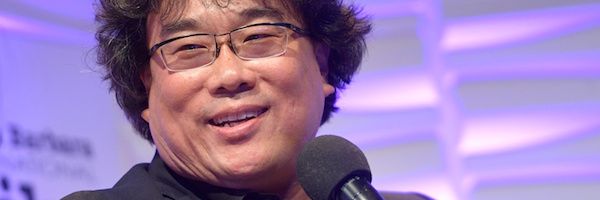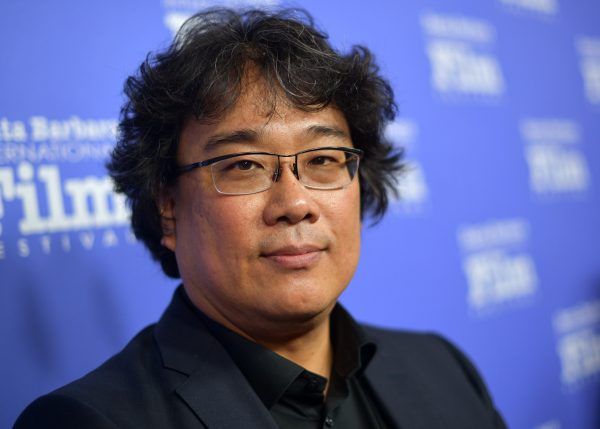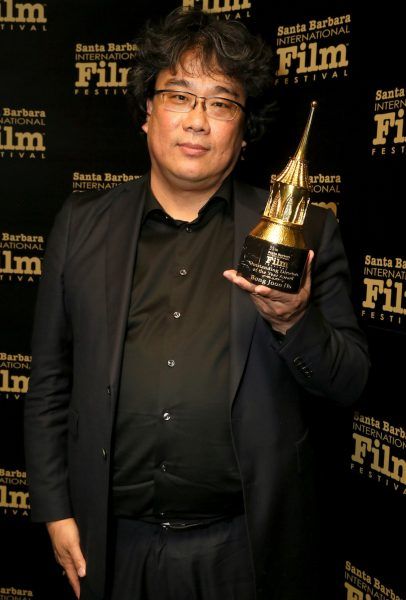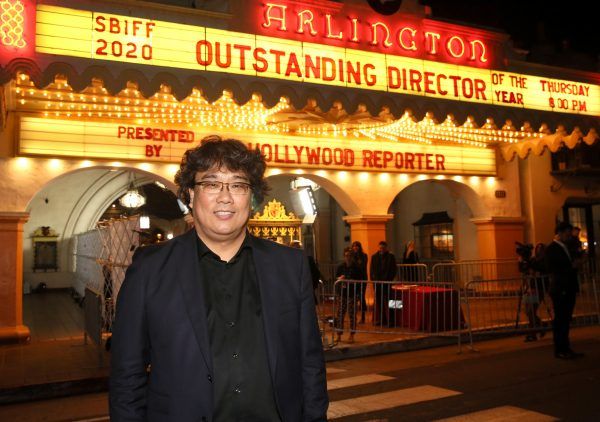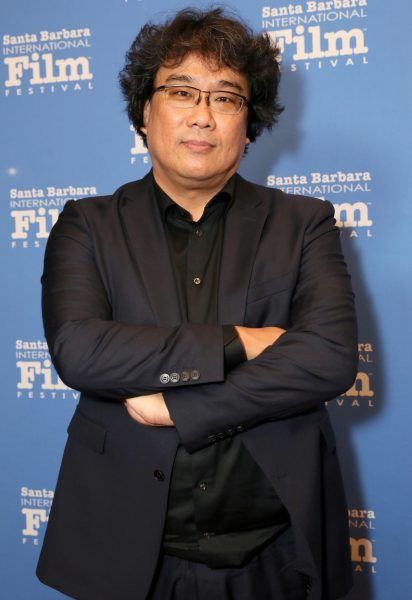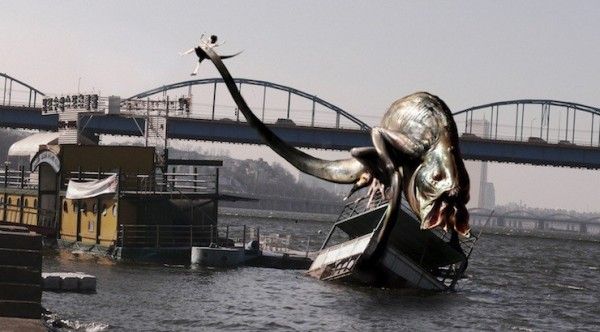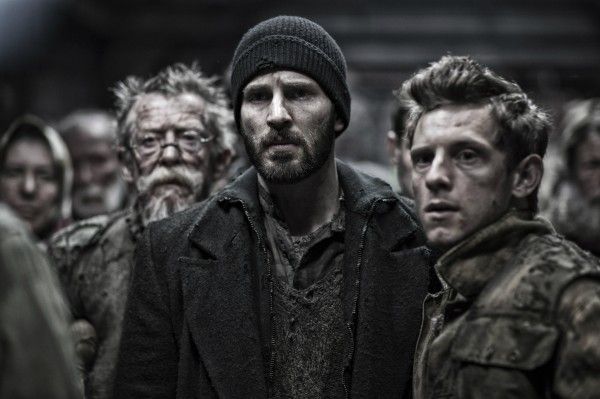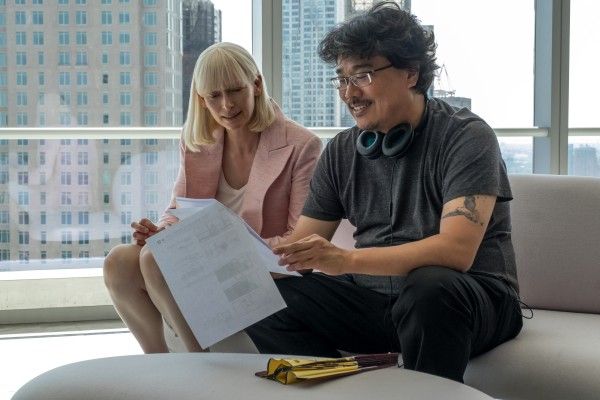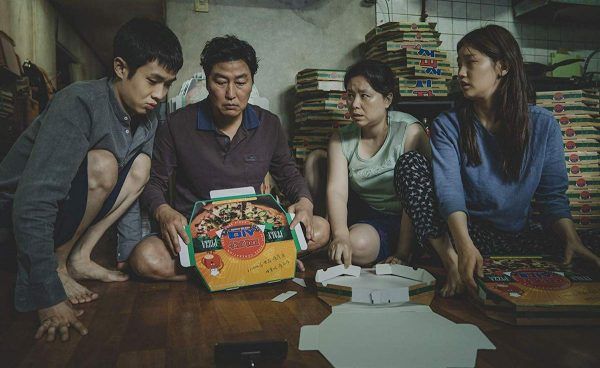The Santa Barbara International Film Festival (SBIFF) presents the annual Outstanding Director of the Year award to a director (or directors, in some previous years) not afraid to push the envelope in the cinematic world, and with an expertise that is both gracious and bold. In 2020, nobody embodies that sentiment more than South Korean filmmaker Bong Joon Ho, whose film Parasite is nominated for six Academy Awards, including both Best Picture and Best International Film.
During the two-hour presentation, featuring clips from all of director Bong’s films, the filmmaker (accompanied by his translator Sharon Choi) spoke in-depth about everything from his life growing up, how he got his first exposure to American cinema, his cinema club at university, what it’s like to be nominated alongside his filmmaking inspirations, his entire filmography, the scene that he fought Harvey Weinstein to keep in Snowpiercer, and what’s up next for him. Here are the highlights of the chat.
Question: Can you talk about your upbringing and background? Where in South Korea were you born?
BONG JOON HO: I was born in the city of Daegu. Korea is a small peninsula, and it’s on the Southern part of Korea. I spent my childhood there, and moved to Seoul.
Was your family upper class, lower class, or middle class? Where did you guys fit in?
BONG: You could say that I grew up in a middle class family. My father is a graphic design professor at a university. If you look at Parasite, where you have the rich neighborhood and the poor neighborhood, you could say that I grew up right in the middle
You grew up in a country with an American presence, and constant tension around the border of your country. How do you think those things may have shaped the person that you became?
BONG: You just provided some historical political context of Korea, but honestly, as children, no one really cares when you’re little. Kids just like to roam around. But for me, in particular, I really loved to watch TV, and films playing on TV. I rarely went outside. My entire family doesn’t like to do sports or travel. Everyone just likes to watch film on TV, so my television was my own personal Cinematheque.
A lot of the TV that you were watching was the American Armed Forces Network, which showed classic and maybe recent American movies in English. Was that how you first got exposed to great cinema, or were you also going to theaters?
BONG: My mother was a little bit of a compulsive germaphobe. She really liked to maintain personal hygiene, and because, in the movie theater, you don’t have a lot of sunlight, she insisted that it was filled with a lot of germs, so I was able to watch films on TV. When I was young, in the 1970s and ‘80s, and I was in elementary school, Korea was under the military dictatorship and the whole country was very conservative. So, when I watched the great films on TV, almost all of them were slightly censored. There was censorship. I watched films by Sidney Lumet and Brian DePalma, and there would be scenes that were omitted from those versions, and even when I was young, I knew that there was something missing, in between those scenes. That’s when I started cultivating my cinematic language.
When it came time to go off to college, you ended up studying sociology, but were you interested in pursuing film?
BONG: I did major in sociology, but I know very little about it. I spent most of my time at a cinema club, and that’s actually where I met my wife. Although I wasn’t really interested in sociology, I was always interested in society, particularly because, at the time, Korea was going through a very dynamic period. When I was in college, in the late ‘80s and early ‘90s, Korea saw the end of the military dictatorship. We had our first democratic administration come in, and that’s when pop culture, cinema and pop music really exploded into the mainstream consciousness. I’m a part of the generation that was blessed.
Why did you call your cinema club Yellow Door?
BONG: It was called Yellow Door because the door of our club room was painted in yellow. That’s why we named it that. My job in the club was to manage the video collection. My job was to illegally copy all of the great American classics, so that we could all study those films.
Were you already starting to make films, at that time?
BONG: It was actually much before that, that I wanted to become a film director. When I was nine, I watched Psycho, and watched The Wages of Fear by Henri-Georges Clouzot. I wanted to become someone behind the camera, ever since then. But I started officially studying cinema and creating short films when I was a part of the Yellow Door club.
You went to a film program after college. Was that where you started making your first proper films?
BONG: When I was part of the cinema club, I did create one short film in 16 mm, and with that as my portfolio, I did a year-long filmmaking program at the Korean Academy of Film Arts. That’s when I officially started making a lot of short films. That was in 1994, when Pulp Fiction was released.
Was Pulp Fiction a particular inspiration for you?
BONG: The film school that I went to, in the same building as my classroom, there was a screening room. I would open the door for my lecture hall, and go straight to the screening room and watch films. Pulp Fiction was playing there, and I remember being so shocked at just the incredible screenplay of that film. These days, I’ve been running into [Quentin] Tarantino very often, at all of these awards ceremonies, so I’m very happy.
That came out in 1994, and all of these years later, you guys are nominated against each other for Best Director, Best Original Screenplay and Best Picture. How does that feel?
BONG: With filmmakers like Tarantino and [Martin] Scorsese, those are people that I studied an analyzed when I was a part of that film club. Scorsese Raging Bull and Mean Streets, I really studied those films. And just to be nominated amongst those filmmakers, in itself, is a huge honor and as such a big joy for me. It feels like I’ve basically won those awards.
After finishing school, there was a period of about five years, you were working on other people’s films that they were directing. And then, in 2000, came Barking Dogs Never Bite, which is basically about a depressed graduate student with at emasculating pregnant wife, who is driven crazy by a neighbor’s dog who won’t stop barking, and he considers extreme measures to silence that dog.
BONG: I know, I know, it’s crazy. And it was partially inspired by my own elder brother. I hope my brother doesn’t watch the video of this on YouTube. He loves dogs.
You made Memories of Murder, three years after that, which is about the hunt for a serial killer and rapist in Korea, by two cops – one a local guy who works off of instinct, and the other being a big city cop who comes in. Why did you decide to make a film about those real events?
BONG: The film was basically about the chaos of the ‘90s. It was really about that time that was just chaos, in itself. At the time, they couldn’t manage the crime scenes, at all. Of course, the modern Korean police force is completely different. They’re able to completely control the crime scenes, they have professional profilers, and they have a lot of forensic tools in their hands. But during the ‘80s, there was a lot of chaos and people were incompetent. That’s when I was in high school, and that’s when all of the serial killings actually happened. And so, that film was a reflection on why they failed to catch the actual killer, and a reflection of how Korean society functioned in the ‘80s. The ‘80s was a very important aspect of that film.
That was also the first time you worked with Song Kang Ho. How did you and he first cross paths, and was it clear, right from the beginning, that you would work well together?
BONG: From the very beginning, I knew that he was the only actor who could play that role, so I wrote the script with him in mind. He was the only person who could represent the face of Korea, in the ‘80s. He also has this animalistic instinct for comedy. So, he’s an actor who had it all. For a film director, it’s quite simple. We just want to work with great actors, and Song Kang Ho is such a great actor that it’s almost fearful, how good he is. I’m sure if you’ve seen the film, you understand.
He’s said that you and he don’t have deep discussions when we go into a project and that you just understand each other. How do you work other actors, that you don’t have as much history with? You do very detailed storyboards and know exactly what you want to do, but you’ve also said that you love nothing more than when your actors improvise. So, how can both things be true?
BONG: I consider [Alfred] Hitchcock my mentor. He’s a filmmaker that I greatly admire and he has a unique philosophy with actors. There’s a famous episode of something he said to Ingrid Bergman. Apparently, Bergman told him that she couldn’t gather the emotions for a particular scene, and Hitchcock said, “Ingrid, just pretend it.” But I don’t really share that philosophy of Hitchcock’s. Of course, I put so much effort into my storyboards, but it’s really mostly for the DP, the production designer, the gaffer, and the technical crew. With those, I do tend to control everything fairly meticulously, but within the stage that is set up through such meticulous control, I want the actors to feel as comfortable as possible. I want them to feel like they’re fish, fresh out of water, free to flop around, whenever they want. And that’s because I’ve already gathered a group of actors that are great and who have great expressive power, so I have a lot of faith in my actors. I think a common misconception among directors is that you have to direct actors, at every second. I think that sometimes interferes with the actors’ process, so on set, I actually try to talk as little as possible.
You also don’t shoot coverage. If something goes wrong in a scene and you don’t notice it later, having coverage helps. Not having that means that nobody else can mess with your movie, after you shoot it, but the downside is that you can’t mess with your movie either. How did you end up working that way?
BONG: It’s my job. That’s why I plan everything. That’s why I do all of my storyboards, and I shoot everything according to my storyboards. But even if you don’t shoot coverage, there’s still a lot that you can do in the editing room. There are a lot of things to experiment with, and a lot of changes and new ideas that you can bring to the table.
After Memories of Murder, you made The Host, which is about a man-eating monster who emerges from the Han River in Seoul, after it’s contaminated. That film became the highest-grossing film in Korean history, at the time that it was released, played very well, all over the world, and really put you on a much bigger map than ever before. Wasn’t the story inspired by a very real, very serious contamination that actually happened, in that river?
BONG: In the two thousands in Korea, we had the case where the U.S. military base threw toxic waste into the river and it, and an environmental NGO in Korea reported it. It was a big scandal. And while being a big social issue, simultaneously, it also felt like a classic sci-fi film from the ‘50s, where a scientist makes a mistake or a soldier throw something away by accident, and then you have this monster. So, while being a part of reality, it also felt like a case that fit with these genre conventions. That’s where the film idea for the film started.
Did you personally also see it as a protest film?
BONG: It’s true that the film is a powerful satire. Even among American films, there are those that provide satire on the U.S. and criticize the government. It’s the same way in Korea and Japan. We have films that are a satire on the U.S. And of course, in terms of the relationship between Korea and the U.S., these two countries have been long time allies, but at the same time, there are a lot of complicated emotions and relationships entangled and that alliance. So, if you’re aware of that context, it does provide a richer background for the film.
Did any of the scenes with the protestors come from your own experience, when you were in college?
BONG: I entered university in 1988, and when I was a freshman, the entire campus was covered in tear gas. It was around the time the military regime was being ousted, so protesting was part of our daily life. We would eat breakfast, go protest, go to our lectures, go back to protest, and then have dinner. And then, on our way home, we would find newspapers with photos of the protest that we were just at. So, it was really part of our daily life.
This was the first time that you had the budget necessary to do CGI on a film. How did you even know where to begin to create a monster like this?
BONG: With The Host, it was the first time I took on this challenge of a visual effects film, and I thought I was going to go crazy. It was so difficult. The only option I had was to just study up on it, myself. There wasn’t anyone to really teach me about it. Cinefex was basically my bible, at the time. I purchased all of the previous issues and studied all of the visual effects scenes that the magazine featured. I just looked through the magazines and studied up on it. The problem was we had a very, very limited budget. The whole production budget was around $11 million, which was a very low budget. We could only use $4.5 million U.S. dollars for visual effects, but we needed more than 160 creature shots which is impossible with that small of a budget. So, I had to cut down the number of visual effects shots that we could have because each shot came with an enormous price tag. And so, ultimately, we ended up having around 110 creature shots. Just going through that experience, myself, I learned how to manage those, those elements. I was really inspired by [Steven] Spielberg because when he created Jaws, Universal Studios created a model of the shark, which malfunctioned often and broke down, all the time. That’s how we came to have the famous POV shot with the John Williams score, where you don’t see the shark, but you see through the lens of the shark’s eyes. And so, he came up with all of these directing ideas to overcome the limitations with special effects. So, with The Host, I welcomed the handicaps that I had, and I tried to overcome them.
With The Host, you had more of an international audience than you’d ever had before, which landed you in Hollywood. Were there a lot of people wanting to work with you in America, at that time?
BONG: When The Host was screened at the Toronto Film Festival, some American industry people came up to me, and I found out that they were the so called agents, at the time. I didn’t even know what agents were. I wasn’t aware of their existence. There were people from six or seven agencies, and that’s when I first got my agent. I kept receiving offers for sci-fi monster films, and whenever I got a script, I would take it to Korea and show it off to my friends. I’d be like, “Look, here’s a script from Hollywood,” and show it off, but then put it on the corner of my desk and let it pile up and just gather dust. I focused on writing my own script, which ended up becoming Mother.
Mother is a film about a young man with some sort of special needs, who is arrested for a murder of a young girl in high school, which prompts his mother to fight for his freedom. You’ve previously said that you wrote the character of Mother for Kim Hye-ja and that you wouldn’t have made the mother without her. Why was she so important?
BONG: More than just being a great actor, Kim Hye-ja is quite an icon in Korea. She’s the nation’s mother. She’s symbolizes motherhood of the nation. And so, I really wanted to explore that, delve deeper into this actor, and present her in a new light. It was actually because of her that I came up with the story and with the project. It wasn’t as if I had other actors in mind, if she refused the role. It was because of her that I did this film. She represents the most generous and giving and warm mother. She’s always played these mother characters that can do anything for their children. If you walk on the streets and run into her, you unknowingly just call her mother. That’s how much she represents that motherly figure. But with the story, I really wanted to explore the dark aspects of motherhood. How motherhood, which is seemingly warm and generous, can turn into a dark obsession, and the extreme situations that can happen when Mother takes a dark turn. That was the dark story that I wanted to explore with that film.
Your first English language project was Snowpiercer, which is a movie that imagines a post-apocalyptic world where we tried to combat climate change and messed up doing it, and the world has been thrown into an Ice Age, where the only living people are on a train that never stops moving. What made you decide to do an English language film with Hollywood actors?
BONG: I didn’t create the film to make Captain America look so ragged. The film was based on a French graphic novel, and I’m a huge fan of comic books and graphic novels. I read a lot of them. When I discovered it in a bookstore, randomly, I was so fascinated by it because of its very unique concept. It’s about humanity’s last survivors on a running train with the rich class on the front cars and the poor and the tail section. That set-up, in itself, was so fascinating to me. That’s why I began the project. For me, it wasn’t about doing a Hollywood film. The film was about humanity’s last survivors on a train, and it would be very strange to have only South and North Koreans on that train. So, very naturally we ended up gathering an international cast, from the U.S., Europe and Asia. It happened very inevitably. It’s actually a Korean film with an English cast because the production company and the financiers were all Korean.
In addition to working with American actors on that film, for the first time, you also worked with American distributors, and one of them was Harvey Weinstein. How did he live up to his nickname of Harvey Scissorhands with you? What did he try to do to Snowpiercer?
BONG: The film was produced by a Korean studio and it had Korean financiers, but the Weinstein Company became the North American distributor that acquired the film. Once the decision was made, my producer gave me a book to read, called Down and Dirty Pictures, and around 80% of the book was about Harvey Weinstein and about how a lot of filmmakers struggled because of his tendency to cut things out of films. Once I read the book, I realized that I really had to prepare myself. To tell you what happened in that year-long editing process, we’d have to stay up all night, so I want to just jump to the conclusion. For me, I consider myself lucky. It was a happy ending because I managed to release the film and my director’s cut. It was a long and complicated process. Ultimately, the film had a limited release, but for me, it wasn’t important whether it was limited or wide release. I was just happy to keep my director’s cut, as I’ve always done with all of my films.
He wanted to get rid of the scene with the fish. What happened there, and how did that end up staying in the film?
BONG: There’s a scene in the film, where someone is slicing open a very large fish with an axe. Harvey Weinstein insisted that we can get rid of that shot and not hurt the story, but it was a shot that the DP and I really liked. I told him, “This is a very personal family thing. This is dedicated to my father. My father was a fisherman.” It was a total lie, of course. I did feel bad, when I told him that lie.
What did he say?
BONG: He said, “Wow, Bong, family is important.” He told all the editors not to touch that shot because it was very important.
Your second partly English language film was Okja, about a child who befriends a genetically modified super pig that is being threatened by a big corporation that she then takes on to save her pig. It was described by one critic as E.T. on crack.
BONG: What a strange movie! Why did someone shoot that movie?!? The woman in the wheelchair, in that movie, is the same actor who played the original housekeeper in Parasite. She was also the voice actor for Okja, so she’s basically screaming and being surprised at herself, in the film.
You’ve previously said that Okja started with one specific image in your mind. What was that?
BONG: One day, I was driving and it was a very foggy, grey day and Seoul, and I saw a huge pig, the size of a house, looking very depressed under a freeway. I was not on any substances. Sometimes I just have these visions. I was very captivated by that image. With The Host, when I was in high school, I thought I saw a very strange creature dangling from the Han River bridge. Similarly, Okja began with my obsession for this one image. I kept wondering why the pig was so big, and then I thought of the food industry’s cruel perspective on animals, where they view these creatures, not as living things, but as food products. Of course, for them, size is directly tied to product value. And then, I ended up thinking about why the pig looked so sad and depressed. Repeatedly thinking about that led me to this very strange story of Okja.
For research for Okja, you went to a slaughterhouse in Colorado. What did you take from that experience?
BONG: They call it beef plant. They never call it a slaughterhouse. They call it a beef plant, and they are very proud of it. It was a modern facility with the latest equipment, and they were actually approved by the humane society NGOs for minimizing the pain that these animals would have to go through. It was a very well-functioning and kept slaughterhouse, but even then, it was very scary being there.
It might sound to people like the underlying point of the movie, for you, was to comment on the treatment of animals, but you’ve previously said that it’s more about the economic system that would lead to such a systematic slaughter of animals.
BONG: I’m a huge animal lover. I have a dog at home, and I do believe that everyone should eat less meat. But my intention wasn’t to declare that everyone should become a vegan and that eating meat is bad. What I really wanted to explore was the process that the meat that we have on our table goes through. They were once animals, and there are people that see a huge profit in that process of them becoming food products. And so, my intention was to dissect the food industry.
In Okja, there’s a scene where the executives at this corporation are huddled in a room, trying to figure out how to deal with the situation, and they are positioned in a very specific way that was inspired by something in the real world.
BONG: It was like that photo of the Obama administration’s war room, when they were killing Osama bin Ladin. We placed all of the characters exactly where the actual people in that control room were placed. In the place of Hillary Clinton was Tilda Swinton, and in the place of Obama was Giancarlo Esposito. The casting director had so much fun, actually casting background actors that looked similar to the actual people in that war room. But it was just a visual joke. It wasn’t really about a profound political message.
Parasite is about a family of four people who infiltrates the home of a family of rich people, and comedy and chaos ensues. The disparity between the haves and have nots has always been a problem, but it feels particularly timely now, at least in this country, and probably also in Korea. When did you first start thinking about making a film about this subject?
BONG: I first came up with the idea for this film in the winter of 2013, which was when I was working on the post-production of Snowpiercer. The themes are connected. They’re both about the rich and poor. I wanted to explore a similar theme, not through sci-fi and action, but through characters that I can see around me, in my daily life.
Aside from Song Kang Ho, most of your Parasite ensemble were actors you hadn’t worked with before. How did you find such a great group of actors that all worked so well together?
BONG: I think the best decision I made, with this film, was forming that task. I had worked with three of the actors before, but the remaining seven of the 10 ensemble cast, it was my first time working with them. Personally, I don’t like auditions. I find it very awkward, calling the actors into an office and having them perform. It makes me feel uncomfortable, watching them. For me, it’s just difficult to get over how awkward the entire situation. So, personally, I love to work, watch their previous works – shorts and indie films. If they’re performing on stage, I go to the show, myself. That’s how I formed the cast, one by one. The most difficult character to cast, and the last one to join the ensemble, was the man in the bunker, and the actor’s name is Park Myeong Hoon. It was difficult to cast this character because the character is so unique, and goes back and forth between being normal and being very abnormal. Another difficulty was having to cast an unknown actor that the public wasn’t familiar with. But thankfully, he played a very important supporting role in an indie film that I liked, so I ultimately decided to cast him. Once he joined, it felt like all of the puzzle pieces came together.
You’ve made seven films now. Did you have any sense that you were making a movie that could go over as well as Parasite has, all over the world, and why do you think it’s had that success?
BONG: I didn’t anticipate it, at all. I never imagined that I would be here, with an audience in Santa Barbara. I just shot the film, as I’ve always done, with my previous works. But last March, when I completed the film, I did realize that I had little regret with Parasite. Whenever I finish a film, I’m always entangled in all of these regrets, but relatively, I didn’t have as many. Obviously, everything that’s happened since Cannes, all of the Academies, and now Santa Barbara, I never imagined any of this. It’s all very new and surprising. You asked me why the film was successful, and I honestly don’t know the answer to that. I think the only answer I can think of is that it’s because the housekeeper came back to the house on that rainy night.
A TV series for Parasite has been announced, and being a comic book lover, you might get an offer to make a comic book movie. After the Oscars on February 9th, whatever happens on that night, what will be next for you?
BONG: The TV series with HBO and Adam McKay is something that I’ve been thinking of, for a long time, since I started writing the script. I had all of these ideas accumulated, with the characters and hidden backstories, that I couldn’t include in the two-hour running time of the film. I just want to spread them all out through this limited series. More than being a TV show, I really think of it as a six-hour expanded film. For my next projects, I’m currently working on one Korean film and one English language film, but those are projects that I’ve been working on, for the past couple of years. I’m just preparing them, as I’ve always done. Nothing has really changed because of what’s happening with Parasite. And both projects are quite small and focused on drama. I think this awards season has to end for me to really focus on writing the scripts, so I’m still in the very early stages of screenwriting.

